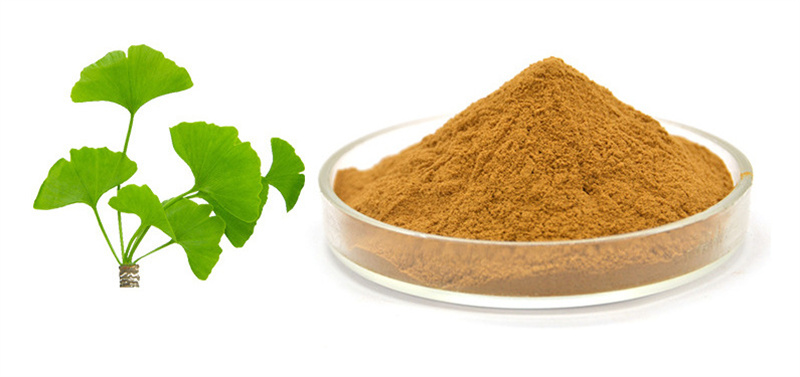
What is Ginkgo Biloba Extract ?
Ginkgo biloba extract is derived from the leaves of the Ginkgo biloba tree, one of the oldest living tree species. It has been used in traditional Chinese medicine for centuries and is now commonly used as a dietary supplement and in some skincare products.
Ginkgo Biloba Extract (GBE) refers to an effective substance extracted from ginkgo biloba, containing ginkgo total flavonoids, ginkgo bilobolides and other substances. It can dilate blood vessels, protect vascular endothelial tissue, regulate blood lipids, protect low density lipoprotein, inhibit PAF (platelet activating factor), inhibit thrombosis, and remove free radicals.
Ginkgo biloba extract is believed to have antioxidant properties and may help improve blood circulation. In skincare, it is often included for its potential to protect the skin from environmental stressors and to support overall skin health.
It's important to note that while Ginkgo biloba extract is widely used, its specific efficacy and safety in skincare products may vary, and it's best to consult with a dermatologist or skincare professional for personalized advice.
Main Component of Ginkgo Biloba Extract
Ginkgo biloba has a wide range of biological activities, containing a variety of chemical components, including flavonoids, terpenes, polysaccharides, phenols, organic acids, alkaloids, amino acids, steroids, trace elements and so on. Among them, the contents of vitamin C, vitamin E, carotene, calcium, phosphorus, boron, selenium and other mineral elements are also very rich, but the most important medicinal value components are flavonoids and terpenoids. Flavonoids and terpenoids have many effects such as vasodilation and antioxidation
What is Ginkgo Biloba Extract used for ?
Ginkgo biloba extract is used for a variety of purposes, including:
1. Cognitive Function: It is often used as a dietary supplement to support cognitive function and memory.
2. Circulation: Ginkgo biloba extract is believed to improve blood circulation, and it is sometimes used to alleviate symptoms associated with poor circulation, such as cold hands and feet.
3. Antioxidant Properties: It is valued for its potential antioxidant properties, which may help protect cells from oxidative damage caused by free radicals.
4. Eye Health: Some people use ginkgo biloba extract to support eye health and alleviate symptoms of age-related macular degeneration and glaucoma.
5. Skin Health: In skincare products, ginkgo biloba extract is used for its potential to protect the skin from environmental stressors and to support overall skin health.
It's important to note that while ginkgo biloba extract is widely used, its specific efficacy and safety in various applications may vary, and it's best to consult with a healthcare professional for personalized advice.
What is the downside of Ginkgo Biloba ?
The use of Ginkgo Biloba extract may have some potential downsides and considerations:
1. Blood Thinning: Ginkgo Biloba may have blood-thinning properties, which could increase the risk of bleeding, particularly when taken in combination with blood-thinning medications or before surgery. It's important to consult with a healthcare professional before using Ginkgo Biloba, especially if you are taking other medications.
2. Allergic Reactions: Some individuals may experience allergic reactions to Ginkgo Biloba, leading to symptoms such as skin reactions, headaches, or gastrointestinal disturbances.
3. Interactions with Medications: Ginkgo Biloba may interact with certain medications, including blood thinners, antidepressants, and certain seizure medications. It's important to discuss its use with a healthcare provider if you are taking any medications.
4. Safety Concerns: There have been reports of adverse effects associated with Ginkgo Biloba, including dizziness, headaches, and digestive issues. Long-term safety and potential side effects of Ginkgo Biloba are still being studied.
As with any supplement or herbal extract, it's important to use Ginkgo Biloba under the guidance of a healthcare professional, especially if you have any underlying health conditions or are taking other medications.
Is it safe to take Ginkgo Biloba every day ?
The safety of taking Ginkgo Biloba every day is a matter of ongoing research and individual variation. While some people may take Ginkgo Biloba daily without experiencing adverse effects, it's important to consider the following:
1. Consult a Healthcare Professional: Before starting a daily regimen of Ginkgo Biloba, it's crucial to consult with a healthcare professional, especially if you have any underlying health conditions or are taking other medications. They can provide personalized advice based on your specific health status and potential interactions with other medications.
2. Potential Risks: Some individuals may experience side effects or adverse reactions to Ginkgo Biloba, especially when taken in high doses or in combination with other medications. These may include gastrointestinal disturbances, headaches, dizziness, and allergic reactions.
3. Individual Health Status: The safety of daily Ginkgo Biloba use can vary based on individual health factors, such as age, overall health, and existing medical conditions. People with certain health issues, such as bleeding disorders or epilepsy, may need to avoid Ginkgo Biloba or use it under close medical supervision.
In summary, the safety of taking Ginkgo Biloba every day depends on individual health circumstances, and it's important to seek guidance from a healthcare professional to determine the appropriateness of daily use.
Who Cannot use ginkgo biloba ?
Ginkgo biloba may not be suitable for everyone, and certain individuals should use caution or avoid its use. Those who should be cautious or avoid using ginkgo biloba include:
1. Individuals with Bleeding Disorders: Ginkgo biloba may have blood-thinning properties, so individuals with bleeding disorders or those taking blood-thinning medications should use caution or avoid ginkgo biloba due to the potential increased risk of bleeding.
2. Pregnant or Breastfeeding Women: The safety of ginkgo biloba for pregnant or breastfeeding women has not been established, and therefore, it's generally recommended to avoid its use during these periods.
3. Individuals with Seizure Disorders: Ginkgo biloba may lower the seizure threshold, so individuals with a history of seizures or epilepsy should use caution or avoid its use.
4. Allergic Reactions: Individuals who have known allergies to ginkgo biloba or related plants should avoid its use to prevent allergic reactions.
As with any supplement, it's important to consult with a healthcare professional before using ginkgo biloba, especially if you have any underlying health conditions or are taking other medications.
What supplements should not be taken with ginkgo ?
Ginkgo biloba may interact with certain supplements and medications, and it's important to be cautious when combining it with the following:
1. Blood-Thinning Supplements: Ginkgo biloba may have blood-thinning properties, so it's important to use caution when taking it with other supplements that also have blood-thinning effects, such as fish oil, garlic, or vitamin E.
2. Antidepressants: Ginkgo biloba may interact with certain antidepressant medications, such as selective serotonin reuptake inhibitors (SSRIs) or monoamine oxidase inhibitors (MAOIs). It's important to consult a healthcare professional before combining ginkgo biloba with antidepressants.
3. Anti-Seizure Medications: Ginkgo biloba may interact with certain anti-seizure medications, potentially affecting their effectiveness. It's important to discuss the use of ginkgo biloba with a healthcare provider if you are taking anti-seizure medications.
4. Diabetes Medications: Ginkgo biloba may affect blood sugar levels, so it's important to monitor blood sugar closely if you are taking diabetes medications. Consulting a healthcare professional is advisable before combining ginkgo biloba with diabetes medications.
It's crucial to consult with a healthcare professional before combining ginkgo biloba with any other supplements or medications to ensure safety and to avoid potential interactions.

Related questions you may interested in :
Does Ginkgo biloba make you sleepy ?
Ginkgo biloba is not typically associated with causing drowsiness or sleepiness. In fact, it is often used to promote mental alertness and cognitive function. However, individual responses to supplements can vary, and some people may experience unexpected reactions. If you notice any unusual symptoms, including drowsiness, after taking ginkgo biloba, it's important to consult with a healthcare professional for personalized advice.
Does Ginkgo biloba give you energy ?
Ginkgo biloba is often promoted for its potential to enhance cognitive function and mental alertness, which may indirectly contribute to a sense of increased energy and vitality. While it is not a direct stimulant like caffeine, some individuals may perceive a boost in mental clarity and focus when using ginkgo biloba. However, individual responses to supplements can vary, and scientific evidence supporting its direct impact on energy levels is limited. If you are considering using ginkgo biloba for its potential energizing effects, it's important to consult with a healthcare professional for personalized guidance.
Is ginkgo hard on the liver ?
There is some evidence to suggest that ginkgo biloba may have the potential to cause liver damage in rare cases. While such occurrences are infrequent, it's important to exercise caution, especially for individuals with pre-existing liver conditions or those taking medications that affect the liver.
If you have concerns about the impact of ginkgo biloba on liver health, it's advisable to consult with a healthcare professional. They can provide personalized advice based on your specific health status and medical history. Additionally, it's important to use ginkgo biloba supplements from reputable sources and to follow recommended dosages to minimize potential risks.
Does Ginkgo Biloba raise blood pressure ?
Ginkgo biloba has been reported to have varied effects on blood pressure. Some studies suggest that it may have a modest hypotensive (blood pressure-lowering) effect, while others indicate that it could potentially raise blood pressure in certain individuals.
If you have concerns about the impact of ginkgo biloba on blood pressure, it's important to discuss this with a healthcare professional. They can provide personalized advice based on your specific health status, medical history, and any medications you may be taking. It's crucial to monitor your blood pressure closely if you are considering using ginkgo biloba, especially if you have hypertension or other cardiovascular conditions.
Is it better to take ginkgo at night or morning ?
The timing of ginkgo biloba intake can vary based on individual preferences and potential effects. Some people prefer taking it in the morning to potentially benefit from its cognitive support throughout the day. Others may choose to take it at night to avoid any potential impact on sleep, especially if they are sensitive to supplements affecting their sleep patterns.
As with any supplement, it's important to consider your own response and consult with a healthcare professional for personalized advice. They can provide guidance based on your specific health status and any other medications or supplements you may be taking.
Does Ginkgo Biloba help with brain fog ?
Ginkgo Biloba is often used to support cognitive function and has been suggested to potentially help with brain fog. Some individuals use it to improve mental clarity and focus, which may contribute to addressing symptoms of brain fog. However, scientific evidence supporting its effectiveness for this purpose is limited and further research is needed.
As with any health-related concern, it's important to consult with a healthcare professional for personalized advice, especially if you are considering using Ginkgo Biloba to address symptoms of brain fog. They can provide guidance based on your specific health status and any other medications or supplements you may be taking.
Can I take ginkgo and Magnesium together ?
Taking ginkgo and magnesium together is generally considered safe for most people. Magnesium is a mineral that is essential for various bodily functions, and it is often taken as a supplement to support overall health. Ginkgo biloba is an herbal supplement that is used to potentially support cognitive function and overall well-being.
However, as with any combination of supplements or medications, it's important to consult with a healthcare professional before taking ginkgo and magnesium together, especially if you have any underlying health conditions or are taking other medications. They can provide personalized advice based on your specific health status and potential interactions between the two supplements.
Post time: Sep-14-2024





